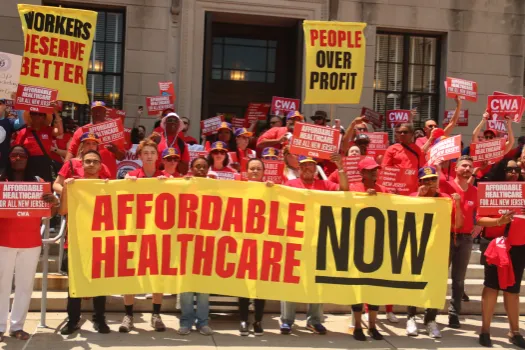Verizon Strike Update: 40K on Strike and What it Means
Yesterday, nearly 40,000 brave working people from Massachusetts to Virginia went on strike to protect good jobs and ensure quality service. It is the largest national strike in recent years.
Verizon workers are striking for more than a fair contract; they’re fighting to protect middle class jobs. As workers in Massachusetts told The Boston Globe
“Without the union, 'these jobs would be off-shored in a heartbeat,' said Bonasoro, 44, of Weymouth. 'Nobody chooses this. What we’re doing here is we’re protecting American jobs. They [Verizon] want to constantly off-shore, outsource good middle-class jobs that support our community. There’s growing public sentiment against corporate greed.'
Bryan Phillips, a third generation Verizon worker from Pembroke, said he fears for his job every time a contract is up.
'I didn’t want to go on strike, none of us did, but at the same time, enough’s enough. Not just for Verizon but everywhere,' said Phillips, 38, who has been a technician for 18 years. 'You don’t see anyone [in other companies] go on strike, because they’re all afraid. They’re afraid they’re going to lose their jobs. But if we don’t fight for these jobs, these jobs won’t be here.'"
Verizon workers not only got the attention of the company, customers and local communities; they have prompted important discussions about Verizon's problematic business decisions, support for unions and what the Washington Post calls a "sense of empowerment among workers who struggled for years to reap the gains of the economic recovery and which could mark a political and economic shift in the balance between employers and their employees."
Reuters columnist Reynolds Holding writes: "Verizon Communications workers are bolstering unions' cautious comeback. The telecom company's staff walked out in one of the largest U.S. strikes in years after contract talks stalled. Add a Supreme Court win, minimum-wage hikes and a big role in presidential races, and organized labor's future begins to look a bit brighter."
Reinforcing what striking workers and their supporters are calling Verizon's corporate greed, The New York Times reports "the company’s overall posture does not appear to be intended to pursue a business model that maximizes the number of middle-class incomes it produces."
“Positively 19th century"is what Tom Juravich, a labor studies professor at the University of Massachusetts Amherst, calls Verizon's business practices in The Boston Globe.
And even though the demand for access to high-speed Internet, which has been promised to millions of households and businesses throughout the East Coast, The New York Times reports: "…Verizon remains ambivalent about Fios. In 2004 the company pledged to lay fiber that could serve as many as 18 million homes. It fulfilled that plan according to its own measure, but has shown little desire in moving much beyond it, leaving several million households with little hope of getting access to the network."
And of course, the expansion of FiOS would be a win for customers, a win for workers and a win for companies. The Times continues: "…Verizon could sustain and expand good-paying work even on the wireline side. Foremost is FiOS, widely regarded as state of the art when it comes to broadband networks, and which the union and the company agree can serve as a foundation for sustaining desirable jobs."
The Washington Postreports on the connection between customer service and worker concerns: "Many of the protesting employees say they are concerned about losing their jobs to foreign contractors who lack the skills to troubleshoot customer problems. By the time customers reach a U.S.-based technician, the company representative must spend an inordinate amount of time soothing customer frustration caused by the previous calls with foreign contractors, said Marilyn Irwin, who served as a Verizon operator for 40 years before becoming president of a local union chapter representing Prince George's and Montgomery counties."
CWA leaders reacted to Verizon CEO's feeble attempt to talk about moral issues, saying: "Lowell McAdam's economic and moral theories are completely hollow, and his name-calling of Senator Sanders is another example of Verizon's boundless arrogance and greed. Mr. McAdam is directing his company to dodge taxes, separate families, shift work overseas and dismantle middle class jobs, and Senator Sanders is not only correct in his factual statements, he is boldly calling out Verizon's corporate greed. The CEO's attacks on the working people who build Verizon's massive profits and their supporters are meant to distract the public from multi-million dollar executive salaries and record profits.
Read full statement here.
The issues for striking workers who continue their picket lines today in New York, New Jersey, Pennsylvania, Connecticut, Rhode Island, Massachusetts, Maryland, Virginia, and Washington, D.C., include outsourcing and offshoring jobs, needless relocation for families and the overall effort to undercut middle class jobs.
For more information or to arrange interviews, contact: Bob Master (917) 657-6483[email protected] CWA Mid-Atlantic District Office (215) 546-5574 Candice Johnson (202) 434-1168[email protected] Eliza Bates (646) 285-8491[email protected] Mark Brueggenjohann (202) 728-6014[email protected]Statement on Verizon Contract Extension Bargaining
CWA Local 1168 Members Settle Big TA, Narrowly Averting a Strike Vote
The Fight Continues—Led By CWA—for Affordable Healthcare in New Jersey
